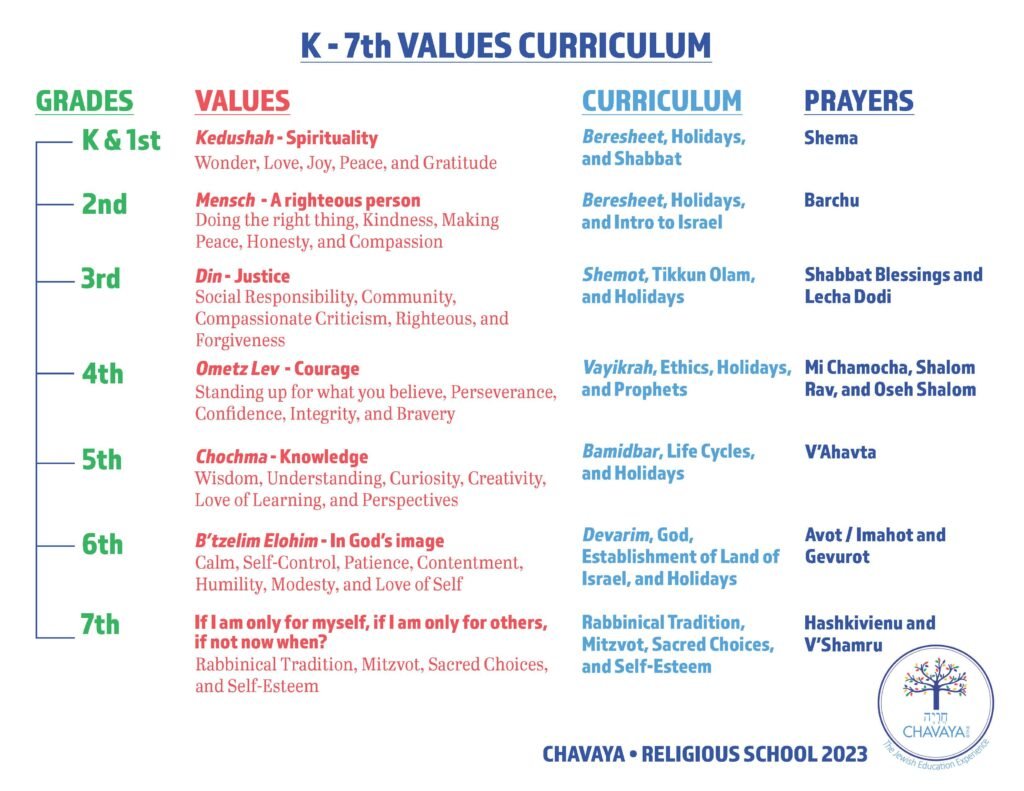Religious School FAQs
- What does Chavaya, the Jewish Learning Experience, mean? Chavaya, pronounced Cha-va-ya, means “the Jewish education experience.” The Chavaya program makes Judaism accessible, meaningful and relevant to our learners. The program is inspired by the powerful learning and identity formation that takes places at camp and youth group experiences.
- What age does the program begin and on what day(s) do students attend? The Chavaya program begins in Kindergarten and we welcome children at any age.
Tuesdays from 4-6pm: Kindergarten-7th grade
Tuesdays from 6:15-8pm: 8th-12th grade
Thursdays from 4-6pm: 3rd-6th grade
Our age cohorts are named for different parts of a tree. The Hebrew word for tree is Etz.
-
- Zera’eem (K-Seeds):
- Shorasheem (1st & 2nd-Roots)
- Nitzaneem (3rd & 4th-Buds)
- Ahleem (5th & 6th-Leaves)
- Aytzeem (7th-Trees)
- What is the learning environment like? Our learning environment is one of mutual honor and respect. Dedicated, creative and enthusiastic educators and teens guide the learning using different learning modalities while meeting the needs of each child. Chavaya participants feel safe and free to express themselves.
- What does the B’nei Mitzvah process and timeline look like? B’nei Mitzvah occurs when a child is 13 years old. Families receive their child’s assigned date in 5th Beginning in 6th grade, children begin preparing to learn Trope (Torah cantillation) with our Cantor. Children begin meeting with the clergy and Director of Education approximately six months prior to their B’nei Mitzvah. These sessions include the child learning to chant prayers and Torah, writing their D’var Torah (speech about their Torah portion), and Mitzvah project. Click here for access to B’nei Mitzvah preparation files.
- What engagement opportunities are available for teens after B’nei Mitzvah? Temple Israel offers engaging programming for 7th grade and beyond. Teens are encouraged to partake in the myriad of opportunities such as eating dinner and learning on Tuesday evening, serving on our Madreecheem (teen volunteers) team on Tuesday or Thursday afternoons, participating in our BBYO, youth group or our Intergenerational Better Together program
- Is transportation provided to the temple on Tuesdays and Thursdays? For children who attend school in New Rochelle, afterschool bussing is provided by the Transportation Office. If your child attends school in another city, parents are responsible for transporting their child/ren.
- How are parents engaged in Chavaya and the wider Temple Israel community? Our families are part of a diverse, engaged and motivated community. They are connected to each other, to Temple Israel, and to the larger Jewish community. By offering meaningful experiences, such as Family Shabbat or Community Shabbat on Friday evenings, participants and their extended families with opportunities for ongoing spiritual growth and connection. We also have a parent committee group that works with our Director of Education. Committee meetings occur four times during the programming year. For more information about our Chavaya K7/Teen Engagement committee, click here.
- Does my family need to be a member of Temple Israel in order for my child to participate in Chavaya? Yes, children attending the Chavaya program are required to be members of Temple Israel. The temple offers a supportive membership structure. To learn more about membership support, click here.
- I’d like to get a better sense of the curriculum. Where can I find this information? To learn more about our curriculum, see below, and click on the image for a pdf.
